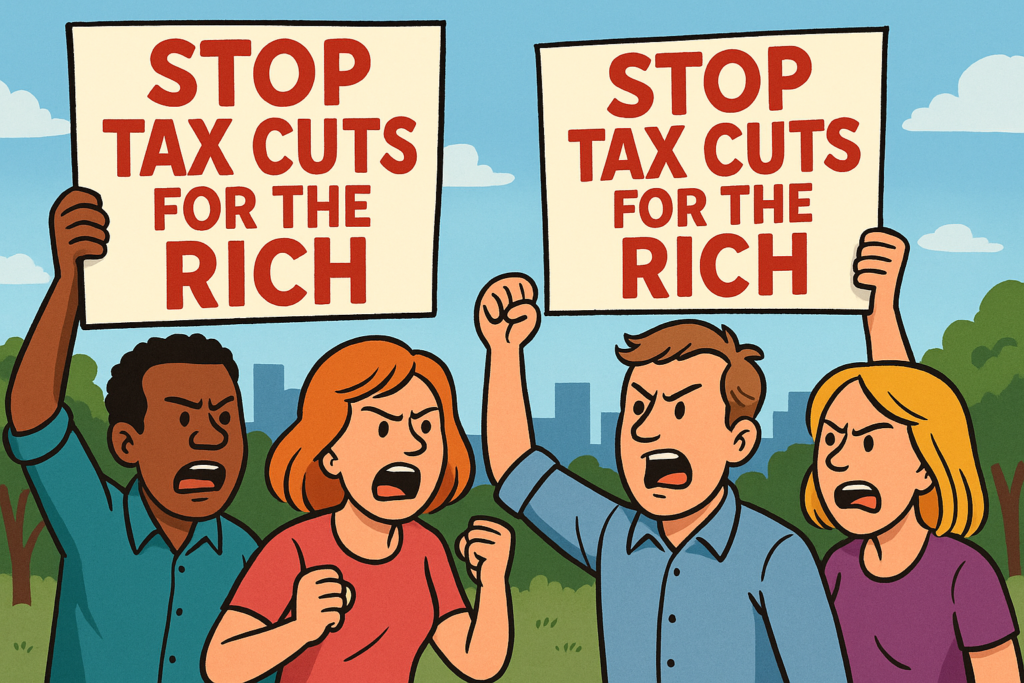
Over the past 50 years, wealthy individuals have been the main beneficiaries of sweeping tax cuts introduced by governments across the world. This has been most visible in advanced economies, where policymakers have consistently reduced tax burdens on top earners and large corporations.
Proponents of these measures argue that cutting taxes on the rich spurs economic growth, stimulates investment, and creates jobs. Critics, however, insist that the evidence points in the opposite direction.
Empirical research has consistently shown that tax cuts for the rich widen inequality, concentrate wealth, and do little to expand employment or lift growth.
In fact, many studies conclude that such policies undermine inclusive development by reducing state revenues and limiting governments’ ability to invest in public services. Despite this, the belief that enriching the wealthy benefits everyone else continues to influence economic policy across much of the globe.
OECD experience
The Organisation for Economic Co-operation and Development (OECD), a bloc of 38 mainly advanced economies, offers valuable lessons on the consequences of tax cuts for the wealthy.
The OECD was founded with the goal of fostering growth and raising living standards. While dominated by high income economies, it also includes emerging countries such as Mexico and Chile.
In 2022, researchers at King’s College London published a comprehensive study on the subject. Their work examined the effects of major tax cuts for the rich in 18 OECD countries between 1965 and 2015. It was one of the most wide ranging investigations of its kind, covering income, corporate, and capital taxes. The study was notable because most existing research either focused on single countries or looked only at specific tax changes.
- The 2023 election: The battle of titans
- The case for nuclear energy
- Combating illicit financial flows crucial for Africa’s development
- Zim Hip-hop Awards joins 50 years of hip-hop celebrations
Keep Reading
The findings showed that the effects of tax policy shifted significantly over time. During the 1920s through the 1940s, many OECD governments relied on progressive taxation. With depleted tax bases following two devastating world wars, governments had little choice but to levy high rates on the wealthy. Top income tax rates averaged around 60%, ensuring that the rich contributed far more than the poor. This arrangement remained in place until the early 1980s.
The 1980s marked a turning point. Across the OECD, governments began cutting top tax rates. Between 1980 and 2015, the average rate on high-income earners fell from around 60% to about 40%. Several factors drove this shift. Politicians sought to appease wealthy sponsors and embraced the assumption that “trickle-down economics” would deliver prosperity for all. According to this theory, giving the rich more freedom to accumulate wealth would eventually benefit society through higher consumption, greater investment, and job creation.
Another important factor was the growing mobility of both capital and skilled labour. As globalisation advanced, investors and high earners could more easily relocate to lower tax jurisdictions. This dynamic eroded the ability of governments to maintain highly progressive systems without risking capital flight. By the 2000s, tax cuts for the wealthy had become entrenched across most advanced economies.
Theories versus reality
Despite their popularity among policymakers, economic theories used to justify tax cuts for the wealthy have not held up in practice. One argument is that lower personal income taxes motivate high income workers to work harder, increasing productivity. The assumption is that affluent employees respond to tax cuts by putting in more hours and intensifying their efforts.
Yet in reality, studies show that such behavioural changes are negligible. Instead, tax cuts often embolden elite workers to push for higher wages, raising costs for firms and dampening investment.
Another justification is that reducing corporate taxes allows companies to save more and reinvest in expansion. Empirical evidence again contradicts this. While tax cuts do increase corporate savings, these funds are rarely directed into productive activities such as manufacturing or services. More often, they are parked in financial assets like bonds and Treasury Bills, offering little benefit to the real economy.
Even supporters of softer tax regimes admit that they exacerbate inequality. Across OECD countries, the share of wealth held by the richest 1% has risen sharply. In the United States, for example, the top 1% now controls 34% of total wealth.
Similar patterns are seen across Europe and beyond. In emerging economies outside the OECD, the picture is even starker: in Brazil the richest 1% own 48% of total national wealth, in India 41%, and in China 31%.
Africa has not been spared. Nine of the 30 most unequal countries in the world are in Sadc, including Zimbabwe. This rising concentration of wealth undermines broad-based growth. Decades of research show inequality restricts opportunity, stifles innovation, and slows overall economic progress. By contrast, progressive tax systems have been found to stimulate entrepreneurship and innovation. When high earners contribute more to the system, governments can invest in education, infrastructure, and healthcare, creating conditions that encourage risk taking and business expansion. The evidence is clear: progressive taxation supports fairness and long term growth.
Implications for Zimbabwe
For Zimbabwe, the lessons are significant. Evidence from the OECD and beyond demonstrates that reducing taxes for the rich does not deliver inclusive growth. Yet no country can implement progressive taxation in isolation.
Wealthy individuals and corporations can easily shift to lower tax environments, depriving states of revenue. Addressing this challenge requires coordinated action at regional and global levels. Zimbabwe should therefore use international forums to advocate for progressive taxation as a collective standard.
Domestically, Harare must exercise caution in offering tax incentives. Exemptions such as Special Economic Zone (SEZ) status should be carefully managed. When incentives expire, they should not be routinely extended. Too often, these measures fail to produce meaningful spill overs for the broader economy, instead entrenching privilege among a small elite.
The urgency of this issue is heightened by new global challenges. The rise of artificial intelligence and automation threatens jobs, while manufacturing continues to shift to emerging markets such as China. At the same time, “greedflation” — where firms exploit crises to inflate prices — is driving costs higher for ordinary households. Under these conditions, governments must safeguard their tax bases and avoid policies that disproportionately benefit the wealthy.
For Zimbabwe, strengthening progressive taxation would help build resilience against these pressures. It would also ensure revenues are available for critical investments in infrastructure, education, and healthcare —investments that support long-term growth and social stability.
Conclusion
The global experience of the past half century makes one conclusion inescapable: tax cuts for the rich do not deliver the promised benefits. Instead, they deepen inequality, concentrate wealth, and undermine inclusive growth. Progressive taxation, by contrast, has been shown to encourage innovation, entrepreneurship, and fairness.
Zimbabwe cannot afford to repeat the mistakes of advanced economies. As it confronts domestic challenges and global disruptions, the country must pursue tax policies that prioritise broad based development over elite privilege. The future depends not on enriching the wealthy but on ensuring growth and opportunity are shared more widely.
Tutani is a political economy analyst. — tutanikevin@gmail.com.






